 This has gotten heated…
This has gotten heated…
Q: How dare Black People accuse British institutions of being racists. You can’t be serious?!?
A: Are you serious?! Just walk in our shoes!
This is a fitting summary of the global dialogue the last few days – after the bombshell March 7, 2021 interview on American TV with Prince Harry and his wife Meghan Markle. Yes, they went there and named, blamed and shamed Buckingham Palace of blatant racist thoughts, feelings, words and actions. See this portrayed in this short exchange here – this Twitter excerpt:
VIDEO – Good Morning Britain’s Piers Morgan vs Dr Shola Mos-Shogbamim – https://twitter.com/GMB/status/1368831131764858881
‘You want to deny the Royal Family has any racist undertones or actions simply because you’re in love with the Queen?’
‘What a load of race-baiting nonsense.’
The debate gets very heated between @piersmorgan and @SholaMos1. pic.twitter.com/6XaH6RrDlV
— Good Morning Britain (@GMB) March 8, 2021
————-
So Black people in Britain are NOT valued as equal citizens?!?! MMMmmmm?!?!
This assertion seems so familiar!
We had previously discussed the actuality of the Caribbean Diaspora who had fled to Great Britain. These ones had learned the harsh lessons that the “welcome mat” that were extended to their immigration did not include respect, hospitality, warmth nor love. 🙁
It is only apropos to Encore that April 21, 2017 commentary again here-now:
————-
Go Lean Commentary – ‘Black British’ and ‘Less Than’
Truth be told, a Black person speaking with a British accent gets more respect than a Black person speaking with a Caribbean slang or a ‘Hip-hop’ /‘Jive’ dialect.
 It is what it is! Notice this portrayal in the Appendix VIDEO where many Afro-Caribbean citizens in Britain, seem to self-identify more as British than their Caribbean heritage; (POINT 5).
It is what it is! Notice this portrayal in the Appendix VIDEO where many Afro-Caribbean citizens in Britain, seem to self-identify more as British than their Caribbean heritage; (POINT 5).
Does this mean that the Black British person is better off on the world stage? Sadly no! The actuality of Blackness still means “Less Than“.
The problem is not the Blackness, but rather Whiteness, the proliferation of White Supremacy … throughout the world.
This is the assertion of the movement behind the book Go Lean … Caribbean, in consideration of reasons why the Diaspora should repatriate back to the Caribbean homeland and why the Caribbean youth should not even depart their homelands in the first place. This thesis was presented in a 9-part series, with these submissions:
- Time to Go: Spot-on for Protest
- Time to Go: No Respect for our Hair
- Time to Go: Logic of Senior Immigration
- Time to Go: Marginalizing Our Vote
- Time to Go: American Vices; Don’t Follow
- Time to Go: Public Schools for Black-and-Brown
- Stay Home! Remembering ‘High Noon’ and the Propensity for Bad American Societal Defects
- Stay Home! Immigration Realities in the US
- Stay Home! Outreach to the Diaspora – Doubling-down on Failure
All of these prior commentaries related to the disposition of the Caribbean Diaspora in the United States; now we take a look at England, Britain or the United Kingdom. There is a difference … supposedly.
“Britain has done a great job as painting itself as the humanitarian, with the US being the torturer. But that shit ain’t true.” – Patrisse Cullors, co-founder of the Black Lives Matter movement.
The purpose of this commentary – considering these source materials below – is to relate the following 5 strong points of contention; (these labels are shown throughout this commentary where applicable):
- POINT 1 – The world is not fair, equal or just; and if you are of the Black-and-Brown races, the injustice is even more pronounced.
- POINT 2 – Charity begins at home! There is a need to reform and transform society wherever you are. No one else will reform your homeland; you must!
- POINT 3 – Leaving home, hurts home.
- POINT 4 – The children of the Diaspora identify more with their current home, than their parent’s ancestral home.
- POINT 5 – When the children do not want to identify with your land of heritage, it is Time to Go, to take them back home.
See this interview here relating Black British reality, with VICE News (UK Desk), the provocative media outlet that exposes the harsh realities of daily life in the Third World and the “First World”; (find more on VICE in Appendix A):
Title: We Spoke to the Activist Behind #BlackLivesMatter About Racism in Britain and America
By: Michael Segalov… Patrisse Cullors is co-founder of Black Lives Matter — the movement and oft-trending hashtag. Based in LA ([Los Angeles]), she’s been on the front line at uprisings across the US in response to a wave of high-profile deaths of black people in police custody.
[While] on a speaking tour of the UK and Ireland, heading to communities, universities, and holding meetings in Parliament. VICE caught up with Patrisse on the train from Brighton to London in the midst of a hectic schedule. VICE chatted [with her] about how she’s spreading the Black Lives Matter movement across the globe, what’s happening in the States at the moment, and why that’s relevant to the UK.
VICE: Tell us about the origins of the Black Lives Matter movement.
Patrisse Cullors: After George Zimmerman was acquitted of the murder of Trayvon Martin, back in July 2013, myself and two friends came up with the hashtag. My friend Alicia had written a love letter to folks, saying, “Our Lives Matter, Black Lives Matter.”I put a hashtag in front—within days people were using it across the world. We’re talking about all black lives; we weren’t just talking about black men dying in the hands of the police. We’re talking about black women, black trans people, black queer people. We want to show that under the current system of white supremacy, anti-blackness has major consequences. Inside the US, and around the world, anti-black racism has global consequences. Black Lives Matter is a call to action—it’s a mantra, a testimony.
How did you end up at the heart of it?
I’ve been organizing since I was 16. I came out as queer, and was kicked out of home. Along with a bunch of other young queer women of color, we raised each other. We also dealt with poverty, being black and brown in the USA, and trying to figure out how to live our daily lives. My brother was incarcerated in LA county jails at 19, and he was almost killed by the sheriffs. They beat him. They tortured him and brutalized him. This was my awakening, seeing how far the state will go, and how they treat our families.Most disturbing was the lack of support and absolute neglect that my brother and my family faced after he was brutalized. Part of my upbringing was a feeling of rage, but I also knew I could do something about it. With my mentors, and a civil rights organization, I learned my craft over 11 years. I focused on the school-to-prison pipeline [where young people go straight from school into the juvenile criminal justice system], environmental justice, and police violence.
…
You’ve been in the UK for a week, how has it been, and how does the situation here relate to the USA?In theory the UK has a significant amount of structures to allow for accountability, of law enforcement in particular. That’s the theory. But in the US we don’t really have these structures to allow for accountability. There aren’t really independent investigators; its just very rare for prosecutions for law enforcement. And so, being here, I’ve realized, there are some systems in place that might actually be good for the US. It just seems those systems don’t work.
Then there are the similarities, the ways in which black people are treated—it’s outright racism. From Christopher Alder being brutalized on tape, hearing the officers calling him racist slurs, to the G4S guards who killed Jimmy Mubenga with racist texts on their phones. You have that same hatred, these white supremacist ideologies coming out of both of our countries. And here too, justice is not being served. We have Mike Brown, no justice. We have Eric Garner, no justice. Here we see the same: Mark Duggan, Sean Rigg. The list is vast.
Is this stuff talked about in the States, like how in the UK we’re aware over here about what’s going on in Ferguson?
Here’s the thing, black people in the US don’t know what’s happening here in the UK. I’m well read, well educated, and coming here and learning these stories I’m like, “Why don’t I know about this? Why haven’t we heard?” The US is very insular. The UK has an image of being better, a humane society in which there isn’t the same level of racism. But now I have a very different perspective that I’m going to take home and talk about. Britain has done a great job as painting itself as the humanitarian, with the US being the torturer. But that shit ain’t true.Here in the UK there’ve been solidarity actions. People shut down the streets in London and Westfield shopping center too. What’s the impact of these things for people on the ground? Do you notice?
Yes, it was noticed. We’ve seen all the work folks are doing on the ground. From here, where you guys shut down Westfield, to Spain and Brazil. In Israel, African refugees are using the Black Lives Matter mantra to talk about law enforcement violence by the Israeli police. We see it, and we’re in awe. We wanted and needed it to go global.Where is this going? What happens next?
There are 23 Black Lives Matter chapters right now, in the US, Canada, and Ghana. We need to uplift the local struggles across the country, as well as pushing for greater accountability for law enforcement.We want legislation that will see divestment from law enforcement and investing in poor communities. We want to build a national project linking families who have been impacted by state violence, with a national database that looks at individual law enforcement officers and agencies. We also want to look at how to develop a system of independent investigation. We want to figure out a victim’s bill of rights, to counter the police bill of rights. Until then, we’re gonna shut shit down.
Source: VICE (UK) News; Posted February 2 2015; retrieved April 20, 2017 from: https://www.vice.com/en_us/article/patrisse-cullors-interview-michael-segalov-188?utm_source=vicetwitterusSee related VIDEO’s here on Britain’s Black History; (POINT 1 and POINT 4):
- That Black British Feeling – Why Black People in the UK are Marching – https://youtu.be/fB2IcH668xo
- Black and British: A Forgotten History Part 1 First Encounters; Full BBC Documentary 2016 – https://youtu.be/6WP6qEc2uaM
- Black and British: A Forgotten History Part 2 Meaning of Freedom – https://youtu.be/Tjq1X3TZ02U
- Black and British: Britain’s Forgotten Slave Owners; The Price Of Freedom (2015) – https://youtu.be/kgaJyp8ix4M
For Caribbean people, the world thinks of us as “Less Than”, whether we are in the Caribbean or in the Diaspora in the UK, Europe or North America. We take the “Less Than” brand with us wherever we go. This is a crisis! The movement behind the book Go Lean…Caribbean seeks to use this crisis, to elevate the Caribbean brand …. globally.
Why is the Caribbean brand perceived as “Less Than”?
Yes, first there is the reality check of being Black-and-Brown in a White world. But also due to our own mis-management of our homeland. It is the greatest address on the planet, and yet our people beat down the doors to get out. Already we have lost 70 percent of our professional classes. So we send this subtle message to the world that “we would foul up the ground wherever we stand”; (POINT 1).
We – the Caribbean region as a collective – must do better; be better! We can reboot, reform and transform from this bad history and bad image; (POINT 2). How?
While easier said than done, this is the comprehensive action plan of the Go Lean book. The book serves as a roadmap for the introduction of the technocratic Caribbean Union Trade Federation (CU). The CU is designed to optimize Caribbean society in the homeland – though there are many benefits to the Diaspora as well – through economic, security and governing optimizations. Therefore the Go Lean roadmap has 3 prime directives:
- Optimization of the economic engines in order to grow the regional economy to $800 Billion & create 2.2 million new jobs.
- Establishment of a security apparatus to ensure public safety and protect the economic engines.
- Improve Caribbean governance – including empowerments for image promotion – to support these engines.
Reforming or transforming the UK, Britain or England is not within scope of the Go Lean/CU effort, notwithstanding the impact on our Diaspora there. But the subject of “Image” is inseparable from any discussion of elevating the Caribbean brand. So this commentary is on image, the facts and fiction of being a minority in a majority world or being an immigrant to a foreign country. This applies to any consideration of the Caribbean Diaspora in the British Isles, where their numbers have been reported between 4 and 5 percent of the population; (POINT 4). Consider these encyclopedic details:
British African Caribbean (or Afro-Caribbean) people are residents of the United Kingdom who are of West Indian background and whose ancestors were primarily natives or indigenous to Africa. As immigration to the United Kingdom from Africa increased in the 1990s, the term has sometimes been used to include UK residents solely of African origin, or as a term to define all Black British residents, though the phrase “African and Caribbean” has more often been used to cover such a broader grouping. The most common and traditional use of the term African-Caribbean community is in reference to groups of residents’ continuing aspects of Caribbean culture, customs and traditions in the United Kingdom.
A majority of the African-Caribbean population in the UK is of Jamaican origin; other notable representation is from Trinidad and Tobago, Saint Kitts and Nevis, Barbados, Grenada, Antigua and Barbuda, Saint Lucia, Dominica, Montserrat, Anguilla, Saint Vincent and the Grenadines, Guyana (which although located on the South American mainland is culturally similar to the Caribbean and was historically considered to be part of the British West Indies), and Belize.
African-Caribbean people are present throughout the United Kingdom with by far the largest concentrations in London and Birmingham.[1] Significant communities also exist in other population centres, notably Manchester, Bradford, Nottingham, Coventry, Luton, Slough, Leicester, Bristol, Gloucester, Leeds, Huddersfield, Sheffield, Liverpool and Cardiff. In these cities, the community is traditionally associated with a particular area, such as Brixton, Harlesden, Stonebridge, Dalston, Lewisham, Tottenham, Peckham in London, West Bowling and Heaton in Bradford, Chapeltown in Leeds,[2] St. Pauls in Bristol,[3] or Handsworth and Aston in Birmingham or Moss Side in Manchester. According to the 2011 census, the largest number of African-Caribbean people are found in Croydon, south London.
Source: Retrieved April 20, 2017 from: https://en.wikipedia.org/wiki/British_African-Caribbean_people
There are a number of insights to glean looking at the demographics of the Afro-Caribbean population in the UK. (See Appendix B below). All in all, the Afro-Caribbean populations in the UK prefer to identify themselves more as British than as Caribbean; (POINT 4).
See this portrayal in the Appendix VIDEO below.
Despite the 60 years of futility, our Caribbean people continue to leave, abandoning our homeland; (POINT 3). This is bad; bad for the people and bad for the homeland. Our people “jump from the frying pan to the fire”:
- Distress continues …
- Oppression persists …
- Image: “Less Than”!
This commentary asserts that it is easier for the Black-and-Brown populations in the Caribbean to prosper where planted in the Caribbean, rather than emigrating to foreign countries, like the UK. The reasons for the emigration in the first place have been identified as “push and pull”. “Push” refers to the societal defects in the Caribbean that drive people to move away (POINT 2); and “pull” factors refer to the impressions and perceptions that life abroad, as in England, is better. More details apply regarding these elusive “pull” factors:
- The UK is NOT the #1 destination for the English-speaking Caribbean Diaspora, not anymore; that distinction is now towards the US. Today’s trending is for more and more new immigration to the US as opposed to the UK; Canada is Number 2.
- While the “pull” factor had been compelling in the past, the decision-making of Caribbean emigrants – looking to flee – now needs a reality check! (POINT 1)
- “Pull” is further exacerbated by the “push” factors; all of these continue to imperil Caribbean life; we push our citizens out. Then the resultant effect is a brain drain and even more endangerment to our society: less skilled workers; less entrepreneurs; less law-abiding citizens; less capable public servants – we lose our best and leave the communities with the rest. This creates even more of a crisis; (POINT 2).
The Go Lean roadmap posits that the entire Caribbean is in crisis now (POINT 3); so many of our citizens have fled for refuge in the UK and other countries, but the refuge is a mirage. The “grass is not necessarily greener on the other side”. Life in the UK is not optimized for Caribbean people. It is easier to fix the Caribbean than to fix the British eco-system. For our Diaspora there: it is Time to Go! For our populations in the Caribbean, looking to depart: Stay! Our people can more easily prosper where planted in the Caribbean … with the identified mitigations and remediation here-in.
The Go Lean book posits that Caribbean stakeholders made many flawed decisions in the past, both individually and community-wise; (POINT 2). But now, the Go Lean/CU roadmap is new (and improved). This is a vision of the CU as a confederation of the 30 member-states of the Caribbean to do the heavy-lifting of championing better nation-building policies, to reboot the region’s economic-security-governing engines. For one, there is the structure of a separation-of-powers between CU agencies and the individual member-states. So there are “two pies”, so citizens get to benefit from both their member-states’ efforts and that of the CU Trade Federation.
The Go Lean roadmap provides turn-by-turn directions on how to reform the society as a whole. This roadmap admits that because the Caribbean is in crisis, this “crisis would be a terrible thing to waste”. As a planning tool, the roadmap commences with a Declaration of Interdependence, pronouncing the approach of regional integration (Page 10 – 14) as a viable solution to elevate the regional engines:
Preamble: And while our rights to exercise good governance and promote a more perfect society are the natural assumptions among the powers of the earth, no one other than ourselves can be held accountable for our failure to succeed if we do not try to promote the opportunities that a democratic society fosters.
As the history of our region and the oppression, suppression and repression of its indigenous people is duly documented, there is no one alive who can be held accountable for the prior actions, and so we must put aside the shackles of systems of repression to instead formulate efficient and effective systems to steer our own destiny.xi. Whereas all men are entitled to the benefits of good governance in a free society, “new guards” must be enacted to dissuade the emergence of incompetence, corruption, nepotism and cronyism at the peril of the people’s best interest. The Federation must guarantee the executions of a social contract between government and the governed.
xii. Whereas the legacy in recent times in individual states may be that of ineffectual governance with no redress to higher authority, the accedence of this Federation will ensure accountability and escalation of the human and civil rights of the people for good governance, justice assurances, due process and the rule of law. As such, any threats of a “failed state” status for any member state must enact emergency measures on behalf of the Federation to protect the human, civil and property rights of the citizens, residents, allies, trading partners, and visitors of the affected member state and the Federation as a whole.
xix. Whereas our legacy in recent times is one of societal abandonment, it is imperative that incentives and encouragement be put in place to first dissuade the human flight, and then entice and welcome the return of our Diaspora back to our shores …
xx. Whereas the results of our decades of migration created a vibrant Diaspora in foreign lands, the Federation must organize interactions with this population into structured markets. Thus allowing foreign consumption of domestic products, services and media, which is a positive trade impact. These economic activities must not be exploited by others’ profiteering but rather harnessed by Federation resources for efficient repatriations.
The Go Lean book details the community ethos to adopt, plus the executions of the strategies, tactics, implementations and advocacies to impact the eco-systems in the Caribbean region.
The book provides these recommendations in regards to the dynamics of Diaspora living:
- Encourage the Caribbean Diaspora to repatriate back to their ancestral homeland – (10 Reasons to Repatriate to the Caribbean – Page 118).
- Dissuade the high emigration rates of Caribbean citizens to foreign stories – (10 Ways to Make the Caribbean Better – Page 131).
These subjects (Repatriation and Diaspora) have been frequently commented on in other Go Lean blogs (POINT 4); as sampled here with these entries:
| https://goleancaribbean.com/blog/?p=11244 | ‘To Live and Die in L.A.’ or London … |
| https://goleancaribbean.com/blog/?p=9485 | 10 Things We Don’t Want from the UK |
| https://goleancaribbean.com/blog/?p=8099 | Caribbean Image: ‘Less Than’? |
| https://goleancaribbean.com/blog/?p=7151 | The Caribbean is Looking for Heroes … ‘to Return’ |
| https://goleancaribbean.com/blog/?p=1683 | British public sector workers strike over ‘poverty pay’ |
The book also relates the significance of image/brand management, as with this advocacy: “10 Ways to Better Manage Image” (Page 133):
The Bottom Line on Martin, Malcolm, Mandela, Muhammad and Marley
The majority of the Caribbean population descends from an African ancestry – a legacy of slavery from previous centuries. Despite the differences in nationality, culture and language, the image of the African Diaspora is all linked hand-in-hand. And thus, when Martin Luther King, Malcolm X, Nelson Mandela, Muhammad Ali and Bob Marley impacted the world with their contributions, the reverberations were felt globally, not just in their homelands. It is hard for one segment of the black world to advance when other segments have a negative global image. This is exemplified with the election of Barack Obama as US President; his election was viewed as an ascent for the entire Black race.
Overall, we must elevate the Caribbean brand. There are active movements now to accentuate the image/brand; consider:
Proclaim ‘International Caribbean Day’
The African Renaissance Monument
Accentuate Caribbean Image Tied to the Dreadlocks Hairstyles
Underlying to the Go Lean/CU prime directive of elevating the economics, security and governing engines of the Caribbean, is the desire to make the Caribbean homeland better, to reform and transform our society. If we can do this, we will dissuade the high emigration rate for our young people. But saying that it is “Time to Go“, must mean that we are ready to receive our Caribbean Diaspora from London and other British cities. Are we?
We are not! But this Go Lean roadmap gets us started. This is the intent of the book Go Lean … Caribbean.
The Go Lean/CU roadmap asserts that Britain should not be presented as the panacea for Caribbean ills – we must reform and transform our own society. While Britain or the UK does some things well, that country does not always act justly towards Black-and-Brown people of Caribbean descent; (POINT 5). We must do this ourselves (POINT 2); our region needs the empowerments here-in (jobs, economic growth and brand/image enhancement).
Now is the time for all of the Caribbean, the people and governing institutions, to lean-in for the empowerments described in the book Go Lean … Caribbean. This is the roadmap to elevate the Caribbean; to make our homeland a better place to live, work and play. 🙂
Download the book Go Lean … Caribbean – now!
Sign the petition to lean-in for this roadmap for the Caribbean Union Trade Federation.
———–
Appendix A – Vice News
Vice News (stylized as VICE News) is Vice Media, Inc.‘s current affairs channel, producing daily documentary essays and video through its website and YouTube channel. It promotes itself on its coverage of “under-reported stories”.[1] Vice News was created in December 2013 and is based in New York City, though it has bureaus worldwide.
Background
In December 2013, Vice Media expanded its international news division into an independent division dedicated to news exclusively and created Vice News. Vice Media put $50 million into its news division, setting up 34 bureaus worldwide and drawing praise for its in-depth coverage of international news.[2] Vice News has primarily targeted a younger audience comprised predominantly of millennials, the same audience to which its parent company appeals.[3]
History
Before Vice News was founded, Vice published news documentaries and news reports from around the world through its YouTube channel alongside other programs. Vice had reported on events such as crime in Venezuela, the Israeli-Palestinian conflict, protests in Turkey, the North Korean regime, and the Syrian Civil War through their own YouTube channel and website. After the creation of Vice News as a separate division, its reporting greatly increased with worldwide coverage starting immediately with videos published on YouTube and articles on its website daily.[5]
Source: https://en.wikipedia.org/wiki/Vice_News
———–
Appendix B – British Afro-Caribbean Demographics
Based on a variety of official sources and extrapolating from figures for England alone, the estimates for the number of people in Britain born in the West Indies grew from 15,000 in 1951, to 172,000 in 1961 and 304,000 in 1971, and then fell slightly to 295,000 in 1981. The estimates for the population of ethnic West Indian in 1981 were between 500,000 and 550,000.[26]
In the UK Census of 2001, 565,876 people classified themselves in the category ‘Black Caribbean’, amounting to around 1 percent of the total population.[38] Of the “minority ethnic” population, which amounted to 7.9 percent of the total UK population, Black Caribbean people accounted for 12.2 percent.[38] In addition, 14.6 percent of the minority ethnic population (equivalent to 1.2 per cent of the total population) identified as mixed race, of whom around one third stated that they were of mixed Black Caribbean and White descent.[38]
In the latest, the 2011 Census of England and Wales, 594,825 individuals specified their ethnicity as “Caribbean” under the “Black/African/Caribbean/Black British” heading, and 426,715 as “White and Black Caribbean” under the “Mixed/multiple ethnic group” heading.[35] In Scotland, 3,430 people classified themselves as “Caribbean, Caribbean Scottish or Caribbean British” and 730 as “Other Caribbean or Black” under the broader “Caribbean or Black” heading.[36] In Northern Ireland, 372 people specified their ethnicity as “Caribbean”.[37] The published results for the “Mixed” category are not broken down into sub-categories for Scotland and Northern Ireland as they are for England and Wales.[36][37] The greatest concentration of Black Caribbean people is found in London, where 344,597 residents classified themselves as Black Caribbean in the 2011 Census, accounting for 4.2 per cent of the city’s population.[35]
The UK Census records respondents’ countries of birth and the 2001 Census recorded 146,401 people born in Jamaica, 21,601 from Barbados, 21,283 from Trinidad and Tobago, 20,872 from Guyana, 9,783 from Grenada, 8,265 from Saint Lucia, 7,983 from Montserrat, 7,091 from Saint Vincent and the Grenadines, 6,739 from Dominica, 6,519 from Saint Kitts and Nevis, 3,891 from Antigua and Barbuda and 498 from Anguilla.[39]
Detailed country-of-birth data from the 2011 Census is published separately for England and Wales, Scotland and Northern Ireland. In England and Wales, 160,095 residents reported their country of birth as Jamaica, 22,872 Trinidad and Tobago, 18,672 Barbados, 9,274 Grenada, 9,096 St Lucia, 7,390 St Vincent and the Grenadines, 7,270 Montserrat, 6,359 Dominica, 5,629 St Kitts and Nevis, 3,697 Antigua and Barbuda, 2,355 Cuba, 1,812 The Bahamas and 1,303 Dominican Republic. 8,301 people reported being born elsewhere in the Caribbean, bringing the total Caribbean-born population of England and Wales to 264,125. Of this number, 262,092 were resident in England and 2,033 in Wales.[40] In Scotland, 2,054 Caribbean-born residents were recorded,[41] and in Northern Ireland 314.[42]Guyana is categorised as part of South America in the Census results, which show that 21,417 residents of England and Wales, 350 of Scotland and 56 of Northern Ireland were born in Guyana. Belize is categorised as part of Central America. 1,252 people born in Belize were recorded living in England and Wales, 79 in Scotland and 22 in Northern Ireland.[41][42][40]
Source: Retrieved April 20, 2017 from: https://en.wikipedia.org/wiki/British_African-Caribbean_people#Demography
———–
Appendix VIDEO – Do you call yourself Black British? – https://youtu.be/i3dgzdsAZug
Published on Oct 21, 2016
- Category: People & Blogs
- License: Standard YouTube License

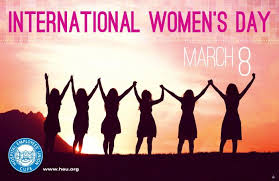
 So prospective marriage mates need to ascertain the Nature and Nurture of a potential partner.
So prospective marriage mates need to ascertain the Nature and Nurture of a potential partner.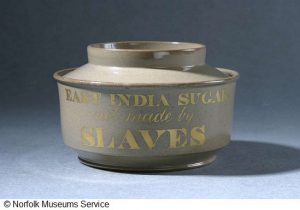 But change is possible! Communities have forged change and been transformed .. in the past, in the present and I guarantee future communities will also forge change.
But change is possible! Communities have forged change and been transformed .. in the past, in the present and I guarantee future communities will also forge change.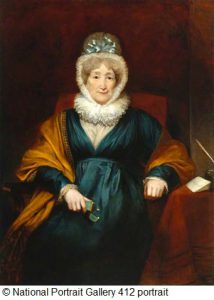 In 1787 she met John Newton and members of the Clapham Sect, including William Wilberforce with whom she formed a strong and lasting friendship. Moore was an active member of the Society for Effecting the Abolition of the African Slave Trade. Her writings reflected her opposition to slavery and “Slavery, a Poem” which she published in 1788 is regarded as one of the most important slavery poems of the period.
In 1787 she met John Newton and members of the Clapham Sect, including William Wilberforce with whom she formed a strong and lasting friendship. Moore was an active member of the Society for Effecting the Abolition of the African Slave Trade. Her writings reflected her opposition to slavery and “Slavery, a Poem” which she published in 1788 is regarded as one of the most important slavery poems of the period.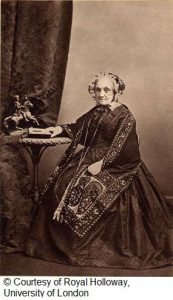 A social reformer and philanthropist, Elizabeth Jesser Reid (from 1789 to 1866) is best known for founding Bedford College for Women in London in 1849. The College is now part of Royal Holloway, University of London.
A social reformer and philanthropist, Elizabeth Jesser Reid (from 1789 to 1866) is best known for founding Bedford College for Women in London in 1849. The College is now part of Royal Holloway, University of London.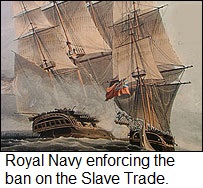
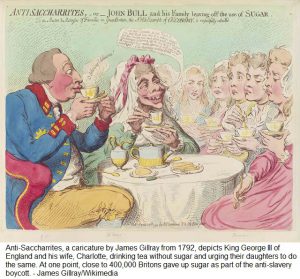
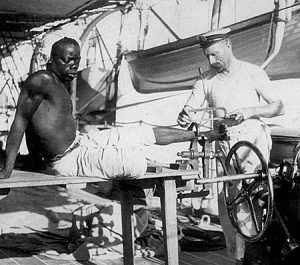
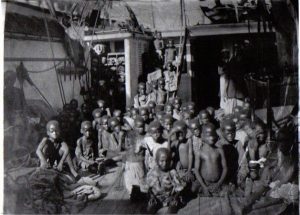
 This is the lessons we glean from the new book by Heather McGhee, that the Zero Sum experience is expensive when Non-Zero Sum is so much cheaper, easier and … just.
This is the lessons we glean from the new book by Heather McGhee, that the Zero Sum experience is expensive when Non-Zero Sum is so much cheaper, easier and … just.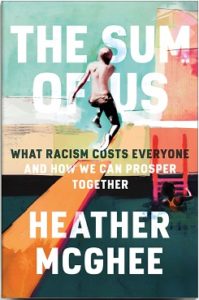 Hinton Rowan Helper was an unreserved bigot from North Carolina who wrote hateful, racist tracts during Reconstruction. He was also, in the years leading up to the Civil War, a determined abolitionist.
Hinton Rowan Helper was an unreserved bigot from North Carolina who wrote hateful, racist tracts during Reconstruction. He was also, in the years leading up to the Civil War, a determined abolitionist.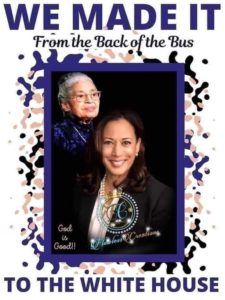
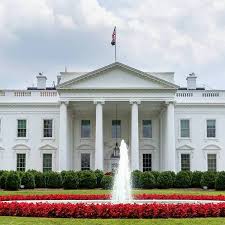 Who is the most powerful person in the world?
Who is the most powerful person in the world? Professor Donald Harris Kamala Harris’ Jamaican father, has vigorously dissociated himself from statements made on the New York Breakfast Club radio show earlier this week attributing her support for smoking marijuana to her Jamaican heritage. Professor Harris has issued a statement to
Professor Donald Harris Kamala Harris’ Jamaican father, has vigorously dissociated himself from statements made on the New York Breakfast Club radio show earlier this week attributing her support for smoking marijuana to her Jamaican heritage. Professor Harris has issued a statement to  This seeming lack of knowledge about the connection between her Indian and Jamaican heritage provides additional ammunition for some Jamaicans who are of the view that Ms. Harris tends to downplay her Jamaican heritage when it suits her, crediting her Tamil Indian mother with the most significant influence on her life and outlook and rarely talks about her father’s influence. Her father Donald, hardly ever gets credit except when mentioned alongside her mother, but rarely as an individual. Even when asked by her host in the now famous ‘marijuana interview’ about her motivation to enter the presidential race, Ms. Harris referenced ONLY her mother whom she said, raised her and her sister Maya with many beliefs and rules – one being never to sit and complain about something, but to do something about it. Yet, anyone who has read ‘Reflections of a Jamaican Father’ Donald Harris’ heart-warming account of how he raised his two daughters, will immediately realize that there is another side to the Kamala Harris story. In that article Donald Harris writes:
This seeming lack of knowledge about the connection between her Indian and Jamaican heritage provides additional ammunition for some Jamaicans who are of the view that Ms. Harris tends to downplay her Jamaican heritage when it suits her, crediting her Tamil Indian mother with the most significant influence on her life and outlook and rarely talks about her father’s influence. Her father Donald, hardly ever gets credit except when mentioned alongside her mother, but rarely as an individual. Even when asked by her host in the now famous ‘marijuana interview’ about her motivation to enter the presidential race, Ms. Harris referenced ONLY her mother whom she said, raised her and her sister Maya with many beliefs and rules – one being never to sit and complain about something, but to do something about it. Yet, anyone who has read ‘Reflections of a Jamaican Father’ Donald Harris’ heart-warming account of how he raised his two daughters, will immediately realize that there is another side to the Kamala Harris story. In that article Donald Harris writes: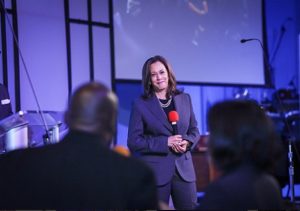 Kamala Harris will have trouble persuading black voters to make her president in 2020. First, the U.S. senator from California must explain why Donald Trump has a better prison-reform record than she had as the Golden State’s attorney general. Then she’ll have to overcome the perception she’ll do anything to climb to the top.
Kamala Harris will have trouble persuading black voters to make her president in 2020. First, the U.S. senator from California must explain why Donald Trump has a better prison-reform record than she had as the Golden State’s attorney general. Then she’ll have to overcome the perception she’ll do anything to climb to the top.
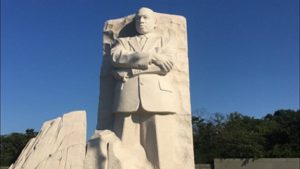 “Free At Last, Free At Last; Thank God Almighty, We Are Free At Last”
“Free At Last, Free At Last; Thank God Almighty, We Are Free At Last”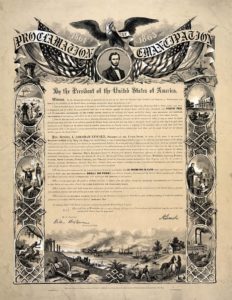
 (See the
(See the  There are many examples of racial oppression, suppression and repression in the US. These experiences may be indicative that something deeper than equality is at stake; there is a Bad Community Ethos – fundamental character or spirit of a culture; the underlying sentiment that informs the beliefs, customs, or practices of a group or society – tied to religious mis-information.
There are many examples of racial oppression, suppression and repression in the US. These experiences may be indicative that something deeper than equality is at stake; there is a Bad Community Ethos – fundamental character or spirit of a culture; the underlying sentiment that informs the beliefs, customs, or practices of a group or society – tied to religious mis-information.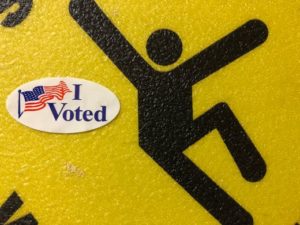 … for our 30 Caribbean member-states, 29 of them feature a majority population of Black-and-Brown people. While this majority does not always equal political or economic power, universal suffrage (one man/woman, one vote) has been transformational in correcting social ills. Universal suffrage equals universal respect, so this should always be at the start of change in society. This teaches us that societal stewards should work to
… for our 30 Caribbean member-states, 29 of them feature a majority population of Black-and-Brown people. While this majority does not always equal political or economic power, universal suffrage (one man/woman, one vote) has been transformational in correcting social ills. Universal suffrage equals universal respect, so this should always be at the start of change in society. This teaches us that societal stewards should work to 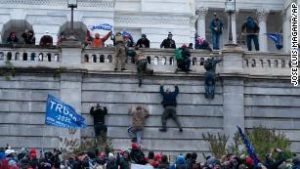
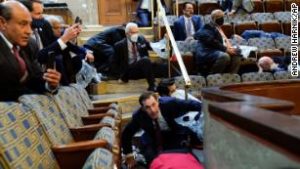


 The same as vision can be corrected with glasses and lenses, community vision or planning can also be perfected with reboots and turn-around activities. Our current vision is bad, we need correction. We cannot see (nor seem to care about) all of our citizens that are fleeing the homeland and looking for refuge elsewhere. Yes, we need to correct our vision; we need to get back to 20/20.
The same as vision can be corrected with glasses and lenses, community vision or planning can also be perfected with reboots and turn-around activities. Our current vision is bad, we need correction. We cannot see (nor seem to care about) all of our citizens that are fleeing the homeland and looking for refuge elsewhere. Yes, we need to correct our vision; we need to get back to 20/20.
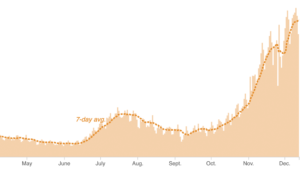


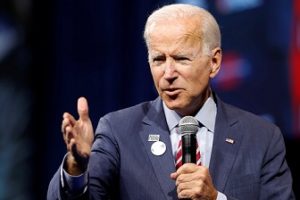



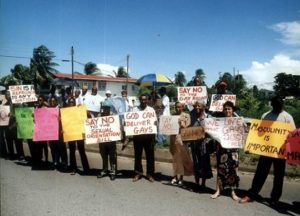

 The Long Train of Abuses is predictable, but not good.
The Long Train of Abuses is predictable, but not good.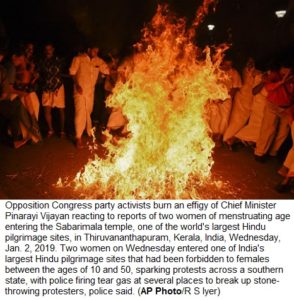
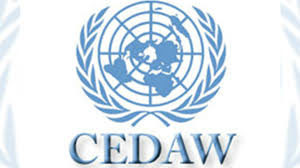
 Ouch! This is not the form of worship that is to be expected from Christianity. Face it, there is a sharp difference between Christianity and Christendom. The Bible gave the clear standard; consider these scriptures:
Ouch! This is not the form of worship that is to be expected from Christianity. Face it, there is a sharp difference between Christianity and Christendom. The Bible gave the clear standard; consider these scriptures: No! Yet, this is not a theoretical discussion; this is observing-and-reporting on the happenstances of our Caribbean society. The actuality reflects the Long Train of Abuses we have had to endure here in the Caribbean, over the centuries, decades and years. Remember the bad
No! Yet, this is not a theoretical discussion; this is observing-and-reporting on the happenstances of our Caribbean society. The actuality reflects the Long Train of Abuses we have had to endure here in the Caribbean, over the centuries, decades and years. Remember the bad  This commentary is not a theological review nor is it chartered for spiritual guidance, but “if the shoe fits …”
This commentary is not a theological review nor is it chartered for spiritual guidance, but “if the shoe fits …”
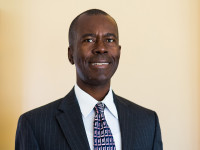
 Do you remember the expression “the Fourth Estate”, referring to the Press or the different expressions of Journalism?
Do you remember the expression “the Fourth Estate”, referring to the Press or the different expressions of Journalism?
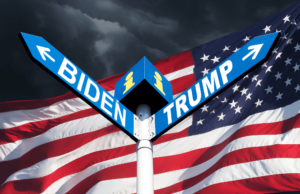 But while recent polls show Trump continues to hold a wide lead over Democrat Joe Biden among religious voters, a bad sign for the president is that some of his support is slipping, including among white evangelicals who, like the faculty at Christian colleges, have a college education.
But while recent polls show Trump continues to hold a wide lead over Democrat Joe Biden among religious voters, a bad sign for the president is that some of his support is slipping, including among white evangelicals who, like the faculty at Christian colleges, have a college education.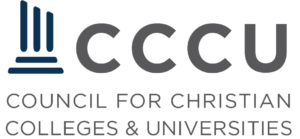 Among those noticing the struggle is Shirley Hoogstra, president of the Council for Christian Colleges & Universities.
Among those noticing the struggle is Shirley Hoogstra, president of the Council for Christian Colleges & Universities. What is the weather right now in Amsterdam, London, Paris and/or Washington DC?
What is the weather right now in Amsterdam, London, Paris and/or Washington DC?
 “They never told us it was dangerous,” Ambroise Bertin says. “So people were working, because they wanted the money. We didn’t have any instructions about what was, and wasn’t, good. That’s why a lot of people are poisoned.” He’s talking about chlordecone, a chemical in the form of a white powder that plantation workers were told to put under banana trees, to protect them from insects.
“They never told us it was dangerous,” Ambroise Bertin says. “So people were working, because they wanted the money. We didn’t have any instructions about what was, and wasn’t, good. That’s why a lot of people are poisoned.” He’s talking about chlordecone, a chemical in the form of a white powder that plantation workers were told to put under banana trees, to protect them from insects.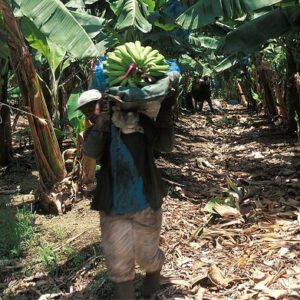 “They used to tell us: don’t eat or drink anything while you’re putting it down,” Ambroise, now 70, remembers. But that’s the only clue he and other workers in Martinique’s banana plantations in the 1970s, 80s and early 90s had about the possible danger. Few if any were told to wear gloves or masks. Now, many have suffered cancer and other illnesses.
“They used to tell us: don’t eat or drink anything while you’re putting it down,” Ambroise, now 70, remembers. But that’s the only clue he and other workers in Martinique’s banana plantations in the 1970s, 80s and early 90s had about the possible danger. Few if any were told to wear gloves or masks. Now, many have suffered cancer and other illnesses.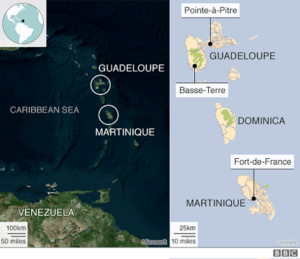
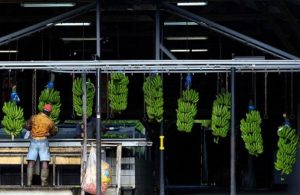 “Those are still the same group of people who have uncontested domination of the land,” says Guilaine Sabine, activist in a grassroots organisation called Zero Chlordecone Zero Poison. As well as campaigning for free blood tests for everyone on the island, members of the group have taken part in a new wave of protests over the last year aiming to draw attention to businesses that activists say have profited from the production and use of toxic pesticides. The demonstrations have been small, and some protesters have been convicted of violence against the police. But they reflect wider anger over the slow pace of France’s response to the chlordecone catastrophe.
“Those are still the same group of people who have uncontested domination of the land,” says Guilaine Sabine, activist in a grassroots organisation called Zero Chlordecone Zero Poison. As well as campaigning for free blood tests for everyone on the island, members of the group have taken part in a new wave of protests over the last year aiming to draw attention to businesses that activists say have profited from the production and use of toxic pesticides. The demonstrations have been small, and some protesters have been convicted of violence against the police. But they reflect wider anger over the slow pace of France’s response to the chlordecone catastrophe.
